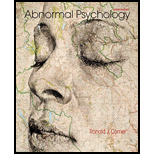
Concept introduction
Transference, an unconscious redirection of feelings from one person to another, is one of the core concepts of psychodynamic therapy. According to Freud, transference allows a therapist to get a glimpse of the client's past conflict-ridden relationships, which can be used to promote insight about the patient.
Explanation of Solution
Suggested response
There are various transference issues that can emerge in therapy of depressed patients. Fear of abandonment by the therapist is the most common issue observed. These patients often feel hurt and alone, longing for a closer relationship with someone. However, while they crave the therapist's attention and affection, they are also afraid that the therapist might reject them.
A common transference pattern seen among these patients is dependent transference. In this, the patients become overly dependent on the therapist, always seeking their help and support, and expecting them to care for them. They experience feelings of helplessness, and require the therapist to constantly reassure them. The other side of dependence is characterized by negative emotions, such as anger and hate. The patient might re-experience previous losses in which the therapist takes the role of a hurtful or non-nurturing parent.
Lastly, some patients might also see the therapist as critical and rejecting. The patient might think that the therapist does not approve of them and their choices, resulting in feelings of worthlessness and anger in the patient. Some other issues that can emerge include feelings of shame and embarrassment, distrust in the therapist's abilities, irregular attendance, and ambivalence.
Want to see more full solutions like this?
Chapter 8 Solutions
Abnormal Psychology
- Summarize key aspects on the buddhism tradition that has impacted your understanding of religious diversity?arrow_forwardwhat important foundational factors and sacred texts and traditions for the buddhism tradition? use 2 scholarly articles properly citedarrow_forwardwhere and how did the buddhist tradition emerge?arrow_forward
- for a drug treatment program what are the prominent theories/models that underlie the service provided. Moral Model, Medical - Disease Model Learning Theory, Psychoanalytic Theory. Ecological Perspective, Family Theory, Bio Psycho Social Theoryarrow_forwardwhat skills or information do you need to improve the quality of your work with Alcohol or drug abuse clients?arrow_forwarddescribe an imaginary/factious treatment agency/program addressing clientele, level of care, curriculum, assessment procedures, treatment plans, case management and counseling issues, staff issues, etcarrow_forward
- Construct an example of a peer evaluation. Instructions: Clarity and coherence of writing Depth of musical analysis Accuracy and relevance of observations Organization and structure of the report Grammar, spelling, and punctuation Originality of workarrow_forwardDraft an example of a peer evaluation. Instructions: Clarity and coherence of writing Depth of musical analysis Accuracy and relevance of observations Organization and structure of the report Grammar, spelling, and punctuation Originality of workarrow_forwardMatch musicians with a style of jazz. Prompts Answers Antonio Carlos Jobim Bossa Nova Tito Puente Latin Jazz Maceo Parker Third Stream Gil Evans Funkarrow_forward
- Write an example of a personal reflection of your course. - What you liked about the course. - What you didn’t like about the course. - Suggestions for improvement. The Reflection Paper should be 1 or 2 pages in length.arrow_forwardHave you experienced a state of flow? If so, please describe what you experienced, and what factors you think contributed to this occurring. If not, discuss what you think might assist you in experiencing flow. Do you believe it is necessary to be in a state of flow to fully engage in creative work; or is it helpful but not strictly necessary? Support your position with your own observationsarrow_forwardThis unit is designed to introduce students to the principles of community psychology and examine local issues through a lens of social determinants of health. Students will explore varieties of community issues such as homelessness, substance abuse, visible and invisible disabilities, and the public health crisis of racism. By analyzing the ways in which SDH intersects with both physical and mental health, both in their own communities and in differing communities, students will understand how social inequities can significantly impact the overall health of a population. Short Description This activity explores how inequality has both physical and psychological impacts on the individual and the community's health. Students will use a step-by-step analysis of SDH around the world. Instructions Using the unit readings, review the Social Determinants of Health: Public Health Agency of Canada. (2020, October 7). Social determinants of health and health and health inequalities. Government…arrow_forward
 Ciccarelli: Psychology_5 (5th Edition)PsychologyISBN:9780134477961Author:Saundra K. Ciccarelli, J. Noland WhitePublisher:PEARSON
Ciccarelli: Psychology_5 (5th Edition)PsychologyISBN:9780134477961Author:Saundra K. Ciccarelli, J. Noland WhitePublisher:PEARSON Cognitive PsychologyPsychologyISBN:9781337408271Author:Goldstein, E. Bruce.Publisher:Cengage Learning,
Cognitive PsychologyPsychologyISBN:9781337408271Author:Goldstein, E. Bruce.Publisher:Cengage Learning, Introduction to Psychology: Gateways to Mind and ...PsychologyISBN:9781337565691Author:Dennis Coon, John O. Mitterer, Tanya S. MartiniPublisher:Cengage Learning
Introduction to Psychology: Gateways to Mind and ...PsychologyISBN:9781337565691Author:Dennis Coon, John O. Mitterer, Tanya S. MartiniPublisher:Cengage Learning Psychology in Your Life (Second Edition)PsychologyISBN:9780393265156Author:Sarah Grison, Michael GazzanigaPublisher:W. W. Norton & Company
Psychology in Your Life (Second Edition)PsychologyISBN:9780393265156Author:Sarah Grison, Michael GazzanigaPublisher:W. W. Norton & Company Cognitive Psychology: Connecting Mind, Research a...PsychologyISBN:9781285763880Author:E. Bruce GoldsteinPublisher:Cengage Learning
Cognitive Psychology: Connecting Mind, Research a...PsychologyISBN:9781285763880Author:E. Bruce GoldsteinPublisher:Cengage Learning Theories of Personality (MindTap Course List)PsychologyISBN:9781305652958Author:Duane P. Schultz, Sydney Ellen SchultzPublisher:Cengage Learning
Theories of Personality (MindTap Course List)PsychologyISBN:9781305652958Author:Duane P. Schultz, Sydney Ellen SchultzPublisher:Cengage Learning





